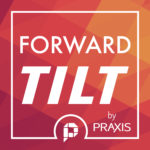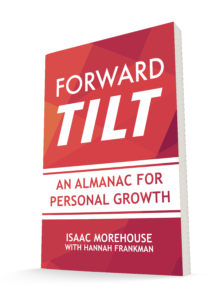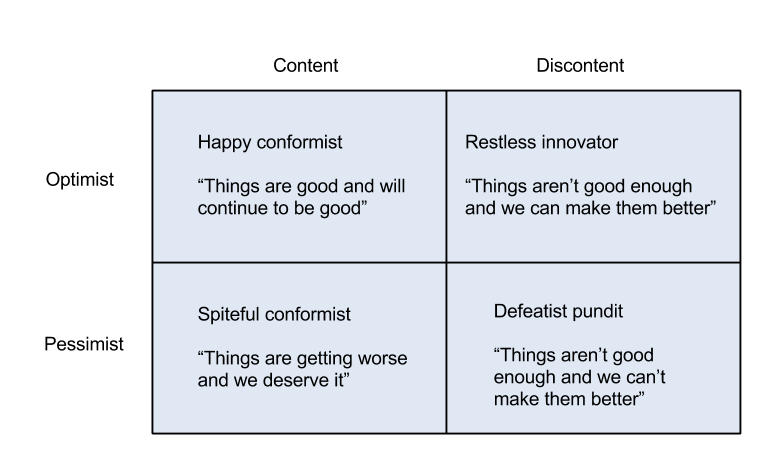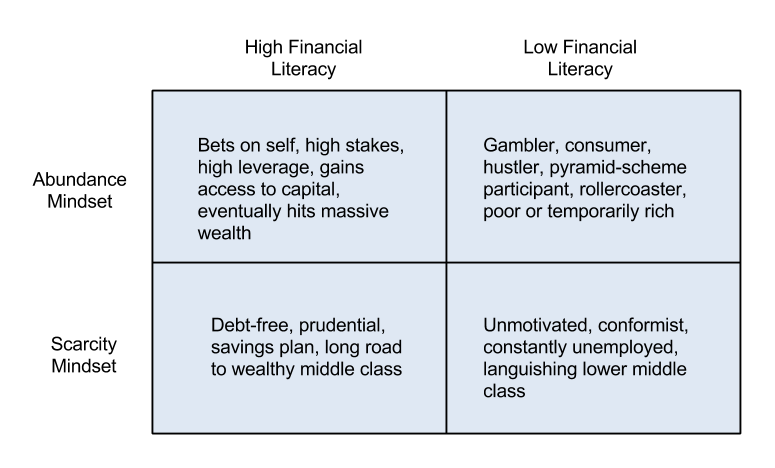These lessons took me a long time to learn. They still take a lot of work to implement and re-implement every day, week, month, and year. I don’t know if I’ll always view them as the three most important life/career lessons, but they definitely were for the first decade of my grownup life, and nothing has yet supplanted them.
The below is adapted from weekly emails I send to Praxis participants and alumni. These three were originally sent to the first ever Praxis class in their last three weeks of the program. They’re also included in the book Forward Tilt.
Lesson #1: Don’t Do Stuff You Hate
(I later wrote a whole book on this one).
Surprisingly, this is one of the hardest to learn.
Maybe it’s the Puritan ideal that suffering through drudgery purges the soul, or maybe it’s the guilt, shame, fear, and obligation we allow to take on from others in the name of altruism. Whatever the cause, we are surrounded with voices, both inner and outer, that subtly nudge us into doing a lot of things that we really don’t enjoy at all. If you step back and ask, “Do I actually want to be doing this?” you might be surprised at how many things get a no.
This doesn’t mean don’t do anything hard. It doesn’t mean don’t do anything painful. I ran a marathon once. The training sucked. Many times while running, I felt I would rather be sitting on the couch with a beer. But I didn’t actually want that. I wanted it in a vacuum, but the real world has trade-offs. In the world of trade-offs, though I wanted the beer and the couch, I wanted to be able to finish a marathon more. I endured pain and hardship because I wanted what it would bring me.
Avoiding things you hate requires ruthless self-knowledge and self-honesty. Do I really not want to do this thing, or am I only avoiding it out of a lack of self-esteem, or lack of focus, or laziness? You can’t feel embarrassed about what you discover.
As a personal example, I do not enjoy phone conversations with extended family members, or with friends I don’t know very well. I used to feel bad about this preference, and subject myself to many long phone conversations that I didn’t enjoy at all (and which I’m pretty sure the other party didn’t enjoy either). It was a weird, guilt-based obligation. Eventually I stopped taking or returning such calls. Now I tell people I’m not much of a phone person, but shoot me an email, and let’s talk when we next see each other.
Once I internalized this lesson, I made it one of my daily, weekly, and long-term goals: To reduce more and more the numbers of things I do that I do not enjoy. Perhaps surprisingly, the more I focused on and succeeded at this, the more hard work I ended up doing. You might imagine pursuing this goal would result in me sitting around a lot (with beer and football), but it turns out that when you’re doing things you like, you actually work well and you want to work. I became more and more productive.
Lesson #2: Do Things All the Way
As long as you’re not doing something you hate, you should do the shit out of whatever you’re doing.
This does not mean only go all in for things you love. It’s to hard to know what counts. What this does mean is that, as long as you don’t hate it, you should do it with everything you’ve got. There are three primary reasons for this.
First, you’ll do everything better when you do it to the best of your ability. Don’t let yourself off the hook with an effort that’s less than your best. Your time is too valuable to spend doing something halfway. Get results.
Second, you will be many times happier and more fulfilled if you work your ass off. Every one of us has this nagging feeling of self-doubt and unease when we’re taking it easy with work, activities, and projects. When you’re busting your ass, you feel pride. It’s a good feeling.
Third, pouring yourself into what you’re doing now is the best way to increase the likelihood of finding and succeeding and what you’ll do next. Opportunities come to people who get shit done, and to those who do so with passion. Skills are acquired and networks built by those who kick ass. By pouring yourself into the now, you’re creating value and doing yourself justice in the present, and you’re also building the foundation for what comes next.
Lesson #3: Be More Than What You Do
The final important lesson in my trio, and the last idea in this book: Be more than what you do.
Considering Lesson #2, it might seem odd for me to suggest you should be more than what you do. After all, doesn’t “doing it all the way” mean living and breathing your work, with everything you have? Yes. Absolutely yes – so much so that I don’t think you’ll ever achieve #3 unless you first master #2.
Somewhat of a paradox. When you’re really immersed in something you discover things about your true self, and you gain abilities and insights that help you awaken to a fuller version of you. The feeling of being “in flow” is an experience of the self, and it exists outside of the particular activities that might have activated that state. That broader self is something you want to always stay in touch with. There are huge benefits if you do.
Being in touch with your broader self makes you better at what you do. When you can both live and breathe your work and yet not take it personally or feel despair over failures, you are unstoppable. You want the win more than anything, but when it doesn’t come, you’re fine, because you’re more than that win. You’re bigger. This mindset is a tough one to earn, but it can be done. When a mistake, or an angry customer, co-worker, or boss can ruin a day, remember – this is just something you’re doing. This isn’t you. If it fails, you don’t fail.
A good test to see how well you’re dually maintaining an all-in mentality and an “I’m more than this” mentality is the shock test. If you quit what you’re doing right now and did something totally different, would your friends and family and coworkers be shocked?
They should be.
If they say, “What? You’re doing something else? But you lived and breathed that job/business/vision/project!” that’s a sign that you were in it and living it and extracting all the value out of it that you could. You did it so fully that others saw you as inseparable from it. But all along you were and are so, so much more.
This happened to me with the first major career change I made. I was surprised to find how surprised those around me were that I was taking my skills and passions to a new arena. I took it as a good sign and resolved to surprise more people every time I took a new step.
Be more. Be a lot more than what you’re currently working on. But never be more in a way that takes you out of the moment, or that limits your ability to be engaged.
If people heard you were changing direction and said, “Yeah, she was never really into it, so I’m not surprised,” then you haven’t been fully engaged. (Unless, of course, the thing you’re quitting is something you don’t like at all, in which case you’re working on #1. The better you get at #1, the less this will be the case. At some point, everything you move on from should seem like a shock because you loved it so much!).
Don’t ever live life without being fully engaged. You’re capable of so much more than that, and you deserve everything that being more has to offer – the depth and richness and fullness of experience that it brings.
Get the book Forward Tilt free, and check out weekly episodes of the Forward Tilt Podcast for more stuff like this.
Like this:
Like Loading...



